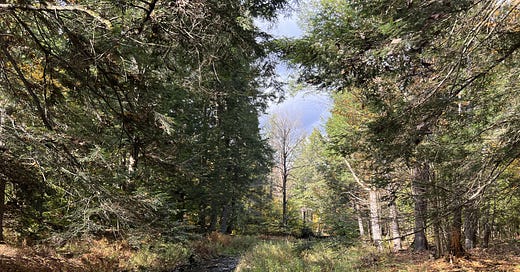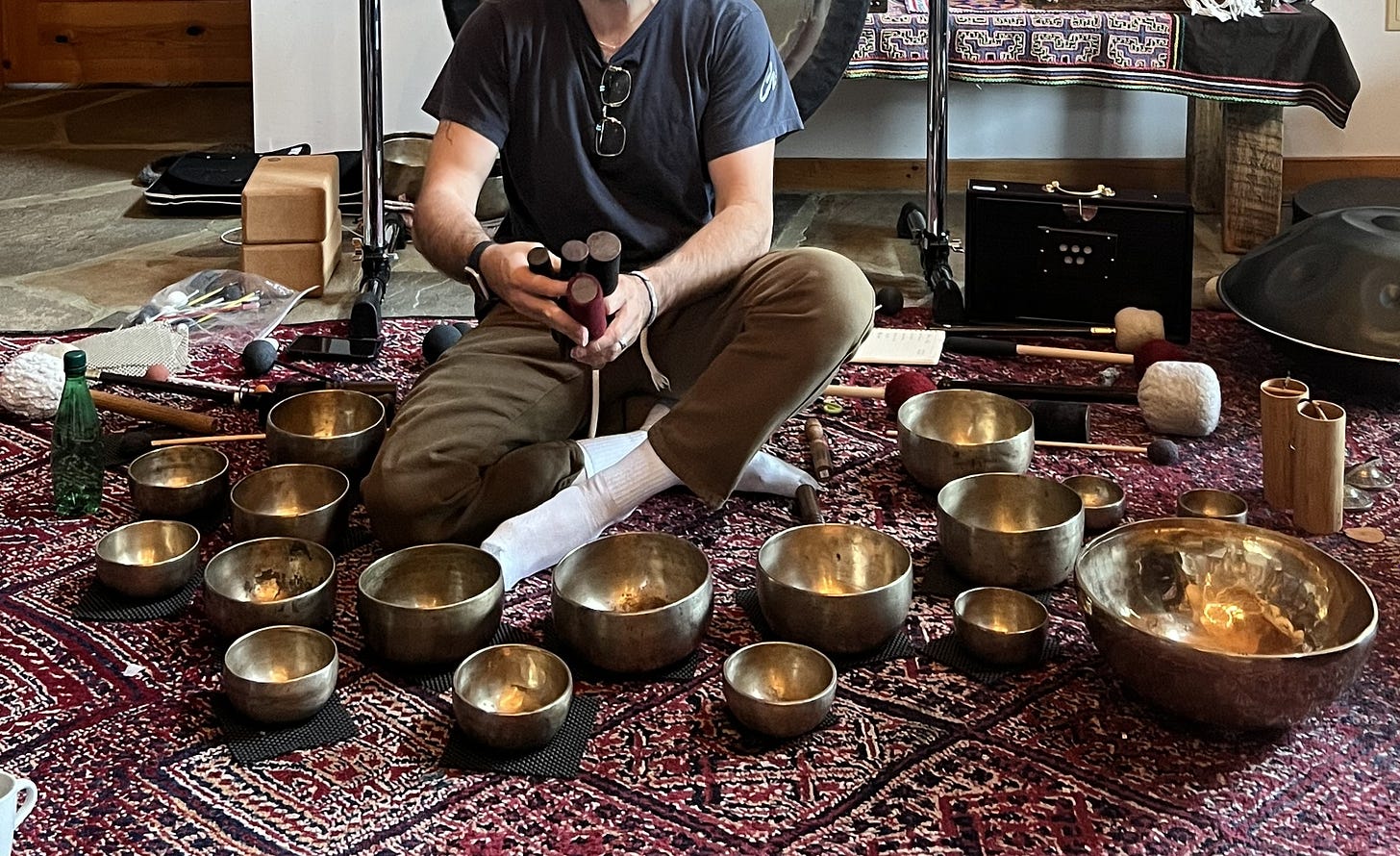Getting out of Your Own Way
“Live in each season as it passes; breathe the air, drink the drink, taste the fruit, and resign yourself to the influence of the earth.” ― Henry David Thoreau, Walden
Hello everyone,
I spent last week at a workshop and meditation retreat in upstate New York. It was an opportunity to learn from masters of a domain I was entirely unfamiliar with: the use of sound and instruments to deepen and guide a meditative state. (Also, a much needed week in nature.)
In one demonstration, Alexandre, one of our teachers, sat down to play a set of Tibetan singing bowls (if you get the chance to listen to something like it live, do it; trust me, your speakers don’t do it justice). This man had decades of experience with his instruments, and I expected him to know exactly how to best demonstrate his craft.
Instead, he remarked how much he relished the act of sitting down with a set of bowls he’d never played before, and without any motif in mind. He was excited to turn the demonstration for his students into a personal exploration, one bowl and interval at a time.
I had expected a well-practiced routine. A well-defined process. Instead, I was struck by his playful and intuitive approach. The moment stuck with me.
My return to New York City was a little jarring. I left the forest’s tranquility and re-emerged in the city’s frenetic buzz. But when I sat down at my desk to write, I still had Alexandre and the singing bowls on my mind.
When I start a new draft, I follow a well-trodden path of process. I know where to look for notes. I know where to search for information. I use the same software, the same pens, the same stained cups of coffee. And I feel a sense of urgency. A desire for efficiency. If only I can be faster, life will be better. More content, more growth, more money. More, faster.
Something similar can happen in investing. A consistent and thoughtful process is viewed as virtuous, sacrosanct even. Seth Klarman described it as “crucial in applying investment principles.”
“It’s important that, as investors and as leaders of a firm, we’re making the same decisions on Tuesdays as on Thursdays, in January and in July, whether we’re up or down and whether the markets are up or down.”
It makes perfect sense. Investors don’t want to reinvent the wheel. The goal is to be effective (find a great investment), efficient (do it without wasting time), and minimize mistakes. They always look for helpful frameworks and checklists.
“I’m a great believer in solving hard problems by using a checklist. You need to get all the likely and unlikely answers before you; otherwise, it’s easy to miss something important.” — Charlie Munger
It’s valuable to have a rigorous process reflecting years or even decades of experience and learning from painful mistakes. But this process can get in our way.
The stakes increase once our identity attaches itself to being a professional, an expert, someone who is good at doing the thing. Mistakes risk embarrassment. They endanger our reputation. How easy to forget the joy and curiosity that brought us to our craft. How easy to become a slave of the process that was supposed to serve us.
At the beginning of the retreat, one teacher told us that if nothing else, we could “learn how to get out of your own way.” I didn’t get it until I watched Alexandre sit down with childlike enthusiasm for his instruments. And then observed myself immediately fall into a routine when approaching my own work.
Behind the retreat center, miles of forest beckoned to be explored.
Everything was vaguely familiar — I’ve seen many forests before — but at the same time mysterious, fresh, and rich in details to be discovered. Step past the first line of trees and a world of texture and smell opens up, with rotting trunks, swaying ferns, collections of mushrooms, and a whispering creek.
A walk in nature has no objectives and no deadlines. There is nothing to win and there are no mistakes. There is nothing to do but to be present and soak up the beauty.
If singing bowls are too abstract, try to think of the project in front of you like a patch of nature you’ve never seen before. Step into the forest and open up to the surprising and unfamiliar. Trust that the process is still there and will prevent you from getting lost. But don’t let it keep you from feeling the excitement of rediscovering what the world has to offer.
Food for thought
One of my favorite quotes on the beginner’s mind:
“People get stuck as they get older. Our minds are sort of electrochemical computers. Your thoughts construct patterns like scaffolding in your mind. You are really etching chemical patterns. In most cases, people get stuck in those patterns, just like grooves in a record, and they never get out of them. It’s rare that you see an artist in his 30s or 40s able to really contribute something amazing. Of course, there are some people who are innately curious, forever little kids in their awe of life, but they’re rare.” — Steve Jobs
I want to highlight a few amazing threads on Buffett’s early investments by Turtle Bay:
Buffett’s Dempster Mill, See’s Candy, Munger’s Belridge Oil, Ogilvy & Mather, and the Detroit International Bridge.
Combine it with Andrew Kuhn’s “how Warren Buffett made his first $100,000.” Stocks were just absurdly cheap:
“My best guess is that Buffett compounded his money at an annual rate of no less than 50% a year and no more than 60% a year from 1949-1954.”
The billionaire optometrist: A fun profile of Herbert Wertheim, a teenage runaway turned optometrist and entrepreneur. Wertheim reinvested his business’s cash flow into high quality public companies, including shares of Microsoft and Apple at IPO. His biggest coup was partnering with the team behind Heico:
“I didn’t want to have a big business. But today, I have a 5 or a 6 or an 8 billion-dollar corporation, each of which I own 10% of.”
Speaking of what creates opportunity, Apollo just picked up op assets on sale from British pension funds.
“Apollo’s Athene annuities business purchased $1.1bn in highly rated collateralised loan obligation funds sold by UK pension funds that faced an avalanche of collateral calls … at an effective 8 per cent yield, a relatively high figure for the safest class of corporate loans. “There was nothing inherently wrong with the CLO tranches we were buying. [They] happened to be the most liquid asset that those entities had to liquidate in order to cover their leverage and margin issues.””
“I think a weakness of many people’s approach to investment is that they try to be jacks of all trades and masters of none.”
“I don’t want to spend my time trying to earn a lot of little profits. I want very, very big profits that I’m ready to wait for."
“Nor will I buy market-favored stocks. I particularly notice it when I attend meetings for technology stocks and see all the people crowding into the room and so on. If there’s standing room only, that’s usually a pretty fair sign it’s not a good time to buy the stock.”
I’ve been enjoying The Investor’s Podcast (aka We Study Billionaires) and their new free newsletter (appropriately named We Study Markets). The terrific William Green hosts his show there and I enjoyed his recent conversation with Tom Russo:
“Mr. Buffett will say that one of the most critical jobs they have at Berkshire is calculating appropriate compensation systems. I recall him saying years back that he had something north of 140 different executive comp packages with his senior most teams, each one separately struck and each one commanding about three pages.”
Enjoyed this conversation between Hugh Hendry an Meb Faber:
"Who am I? I am someone with an unquenchable thirst for the joy of life. Joy is my energy. One of the things that’s kept my joy flowing is a very simple rule. I buy things that are going up and I sell things that are going down."
"The role of a professional speculator is to conceive of a warehouse full of good narrative but not to rush out immediately and invest. To have the composure to say, “It’s wonderful but just not now.” When is now? Now is when strangers are clearly buying the thing."
Found this idea in an old podcast with Kat Cole. The ‘hot shot’ method:
“I envision a badass in my role tomorrow and I ask myself ‘what is one thing they would look at and immediately address?’ We've all been the new person that took over from someone else. Or we bought a company from someone else. The person's job we take over or the person's business we buy, to them, it's probably the best it's ever been. The irony is that on the same day, it is the worst it will ever be to us. Because it's the beginning of the journey.
That act of pausing, reflecting, asking what someone else would do, acknowledging it very quickly. And then the trick is taking action right away. I take action on it within 24 hours. I tell my team. Every time, they say, 'What took you so long?' That is how I get better every week.”







That meditation retreat sounds really cool. Could you please provide a link to it? Thanks! - Mike